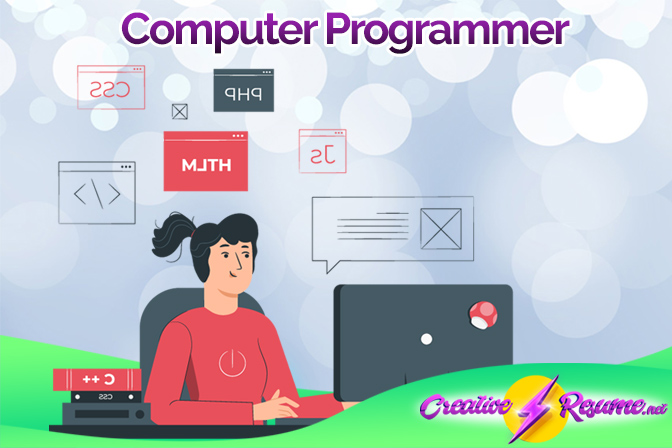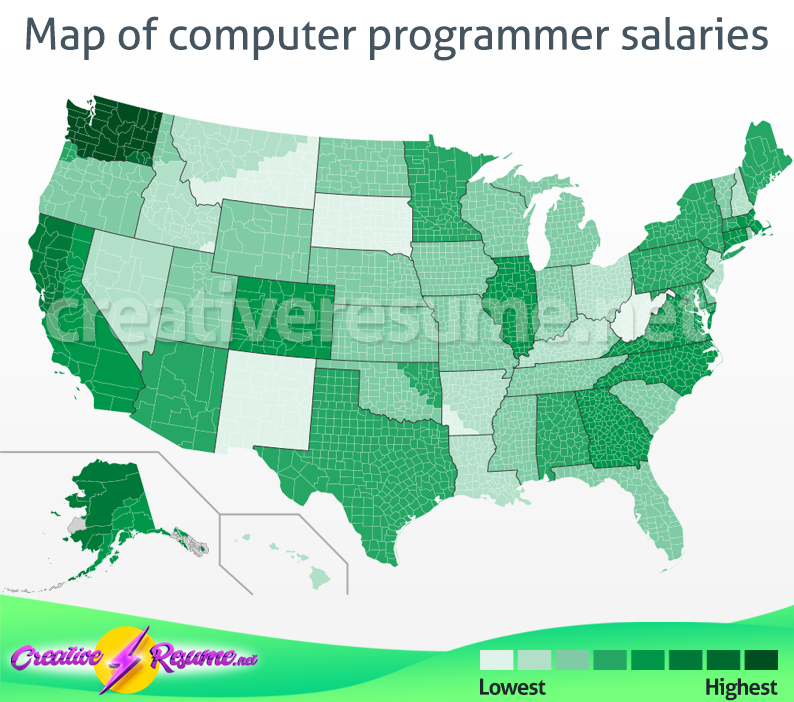
Job description: What does a computer programmer do?
The field of software applications is booming. Apps are downloaded in abundance, intelligent software has become an integral part of the world of work, and cars, refrigerators, and heaters also communicate with their users via smart applications. Programmers are behind all of this. They are the architects of modernity and develop new or further programs. The tasks are very different and range from the development of learning software to the optimization of a search engine to the creation of a database or the programming of industrial robots.
The career prospects for programmers are accordingly excellent. Hardly any area in the world of work can do without supporting IT and so those who create the programs and get them up and running are desperately sought after.
But those who are asked also have a lot to do. The schedules in this job profile are full to the brim and overtime is also programmed. Depending on the area in which an expert works, shift work is sometimes called for. On the other hand, the salary is not bad and employers are now trying to take at least a little of the pressure off the stressful everyday life through work-life balance offers.
Education: How do you become a programmer?
Most programmers have completed a degree in computer science at a university or a vocational academy. It is not uncommon for graduates from an engineering or natural science course to find a job in software development. However, these are not mandatory requirements.
Also, have good chances:
- IT Specialist
- Software developer
- Software engineers
- Software architects
Also, many lateral entrants gain a foothold as programmers. They have either acquired the necessary knowledge self-taught or acquired through various training courses that the relevant training providers offer in abundance.
Employer: Who is looking for programmers
Programmers are wanted practically everywhere because all industries use IT applications. The trend is increasing. All doors and gates are therefore open to programmers: from classic IT to public services, logistics, healthcare. It doesn’t hurt to do extensive research to see what options are available. Because: Programmers can currently choose their employer.
Because the job is often stressful and requires a lot of commitment, employers are currently rushing to find offers that contribute to a better feel-good atmosphere in the company. Above all, the generic IT companies have recognized that they have to offer their people something to keep them. Otherwise, there is a high risk of migration.
So the prospects for high-quality incentives, health offers, events, and sports offers in the workplace are not bad, especially for programmers.
Salary: How much does a computer programmer make?
With the programmer job profile, relevant programming experience weighs more heavily than a university degree. So if you have a lot of practical experience with you, you can have it paid for. Programmers can expect a starting salary of between 3400 and 4100 dollars gross per month, depending on the industry.
Map of computer programmer salaries
The darker areas on the map show where Computer Programmers earn the highest salaries across all 50 states.

- Median Annual Salary: $86,550
- Top 10% Annual Salary: $140,250
- Bottom 10% Annual Salary: $50,150
Source: U.S. Bureau of Labor Statistics
The following sectors are particularly well remunerated:
- Medicine
- Automotive industry
- Banks
- Insurance
Compared to other job profiles in the IT industry, programmers are roughly in the middle in terms of income. With increasing professional experience, the gross earnings are up.
Entry Opportunities: The Prospects for Programmers
Many students already have career opportunities during their university days. Many young academics offer services for companies as freelancers. A win-win situation for both sides: while the companies save money, the young professionals gain experience. And in the long run, it is worth real money for you.
But that is only one of many possibilities. There is no classic career entry for programmers because there is no dedicated training either. For many young professionals, contacts to companies they have made during internships prove to be the main entry point into the profession. Others go the classic route of application – which has no less chance of success.
Application: How do programmers score
We are generally looking for programmers with knowledge of the following programming languages:
- Visual Basic for Application (VBA)
- Visual Basic .NET
- C ++
- C # (C sharp)
- PHP
- HTML
- CSS
- Java
That sounds like an awful lot of material that should be proven in the application documents. But it is not necessarily like that: As a rule, employers only require knowledge of two relevant programming languages. And: learning has changed radically since the early days.
Modern programmers are also a type of user who can access ready-made development environments in most programming languages. This makes it much easier to develop or adapt software and integrate it into existing systems than it was a few years ago.
Further requirements for the profession are:
- Technical understanding
- Sense of logic
The more practical experience, the better. Young professionals in particular can score points by providing evidence of internships or relevant further training.
Career: Development opportunities as a programmer
The programmer’s job profile has a wide range of development opportunities:
- Database administrator: A database administrator (DBA) is responsible for the administration of a database management system (DBMS).
- Datacenter management: Data center managers ensure that data center operations run smoothly, that the existing infrastructure is maintained and that regular updates are carried out. Also, they develop concepts for improving the technical standard of the installation.
- Entrepreneur: Many programmers set up their service offering at some point and manage their own (programming) company.


